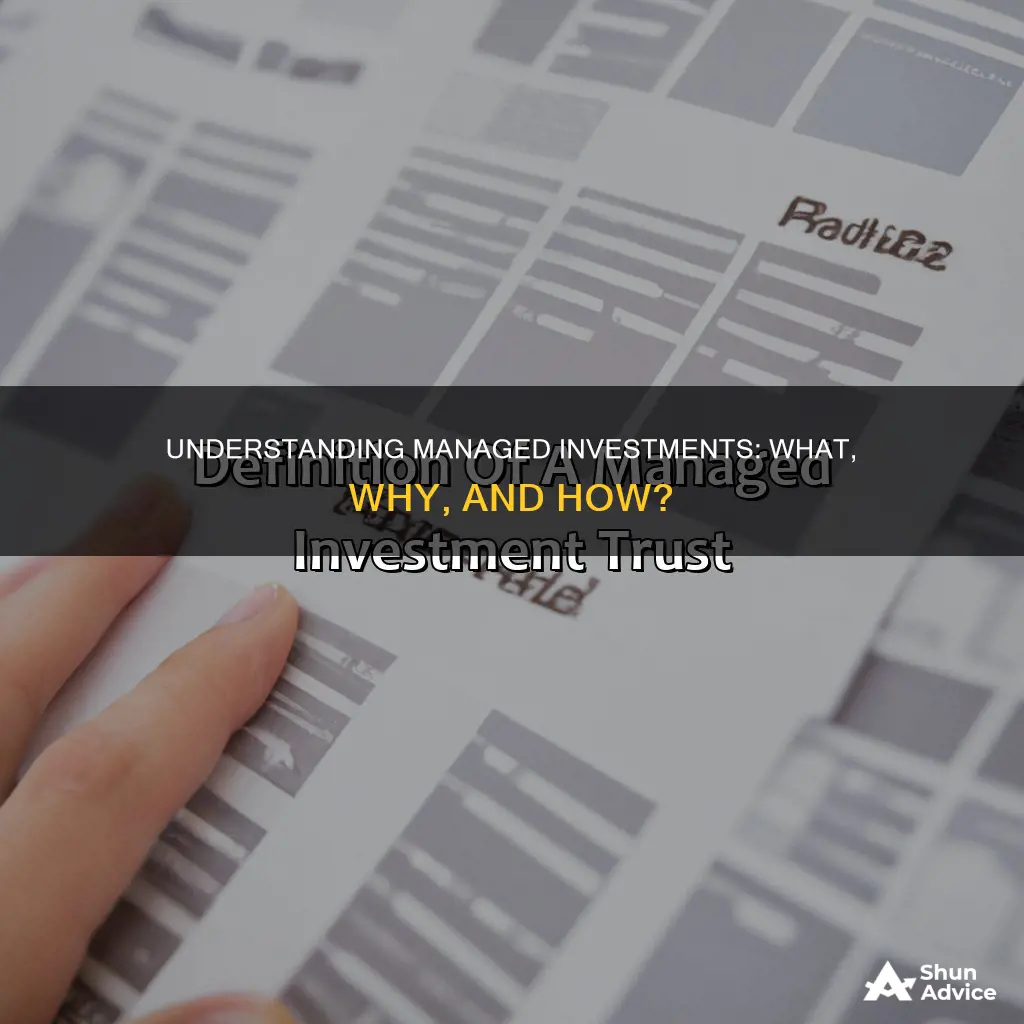
Managed investments are a type of investment where money from multiple investors is pooled together and used to buy a variety of assets, such as cash, shares, bonds, and property. The main appeal of managed investments is that they simplify the process of investing by having a professional investment manager select and manage the assets on behalf of the investors. This provides investors with access to opportunities that may not be available to them if acting alone. Managed investments also provide a level of diversification that may be difficult for individual investors to achieve on their own. However, it's important to note that managed investments come with risks, including the possibility that the investment manager may not perform as expected.
What You'll Learn
- A managed fund is a 'registered managed investment scheme'
- A fund manager oversees the fund and makes investment decisions
- Investors buy 'units' in the fund
- Managed funds can invest in a single asset class or a mix of different asset classes
- Managed funds are relatively cheap and easy to add extra funds to

A managed fund is a 'registered managed investment scheme'
A managed fund is a registered managed investment scheme, which is a type of unit trust. In a managed fund, investors' money is pooled together and used by the investment manager to buy and manage investments on behalf of all investors in the fund. This pooling of funds allows investors to access opportunities they may not have been able to access individually.
When an investor invests in a managed fund, they are assigned units proportionate to the amount of money they have invested. The fund is open-ended, meaning that new units are created as investors join, and cancelled as investors leave. The trustee, or fund manager, manages a portfolio of investments, such as shares or corporate bonds, on behalf of the beneficiaries. The number of units owned represents a proportional interest in the trust, similar to company shares.
Managed funds cover a wide variety of arrangements and underlying assets. Some examples include cash management trusts, Australian equity (share) schemes, international equity schemes, exchange-traded funds (ETFs), agricultural schemes, and property funds.
The main appeal of managed funds is that they take the complexity out of investing by having a professional investment manager select and manage the assets. This also provides a level of diversification that would be out of reach for most individual investors. Additionally, managed funds are relatively cheap and make it easy to add extra funds periodically.
However, managed funds also have their disadvantages. One of the main drawbacks is the high fees charged by fund managers, which can include management fees, performance fees, and establishment fees. Another issue is their open-ended nature, which can cause problems during market panics or crashes when a large number of investors try to sell their units simultaneously.
Investing My Daughter's Savings: Strategies for Long-Term Growth
You may want to see also

A fund manager oversees the fund and makes investment decisions
A managed fund is an investment vehicle overseen by a fund manager, who is responsible for making investment decisions and monitoring the fund's performance. The fund manager's role is similar to that of a trustee in a trust, and they ensure that the fund pays its operating costs and taxes.
In a managed fund, investors' money is pooled together, allowing the fund manager to buy and sell assets such as cash, shares, bonds, and listed property trusts on behalf of the investors. The fund manager's expertise and knowledge are utilised to maximise returns for the investors. The number of units an investor owns in the fund represents their proportional interest.
The fund manager's investment decisions are based on the fund's objectives, strategy, and risk profile. Some funds invest in a single asset class, such as shares or bonds, while others invest in a mix of different asset classes. The fund manager may also invest in specific sectors, such as infrastructure or property, or focus on a particular country or industry.
The main advantage of having a fund manager is that they take on the responsibility of selecting and managing investments, making it easier for investors who may not have the time or knowledge to do so themselves. Additionally, pooling funds allows investors to access investment opportunities that may not be accessible individually. Fund managers also provide diversification, reducing the overall risk for investors.
However, a disadvantage is the high fees associated with managed funds, which can include management fees, performance fees, and establishment fees. These fees can impact the overall returns for investors, and finding a fund manager who consistently delivers market-beating performances can be challenging.
Breaking Up with Your Investment Manager: A Guide
You may want to see also

Investors buy 'units' in the fund
Investors buy units in the fund, which means they are assigned units proportionate to the amount of money they have invested. This is known as a unit trust, and new units are created as investors join the fund. The number of units owned represents a proportional interest in the trust, similar to company shares.
When investors buy units in a managed fund, they are buying into a pool of capital from other investors, which a fund manager monitors and makes decisions on behalf of to try to maximise returns. The fund manager will buy and sell assets such as cash, shares, bonds and listed property trusts.
The value of the units will rise and fall with the value of the underlying assets. The fund's performance depends on its objectives, strategy and risk profile. Some funds invest in a single asset class, such as shares, while others invest in a mix of different asset classes.
Managed funds are open-ended, meaning that units are cancelled as investors redeem their investment. The minimum amount to invest in a managed fund is typically around $5,000, and investors can often add extra funds periodically.
Opening an Investment Firm: Key Steps to Success
You may want to see also

Managed funds can invest in a single asset class or a mix of different asset classes
Managed funds, also known as 'mutual funds', are investment vehicles that a fund manager looks after. They are a type of unit trust, where investors' money is pooled together and used to buy and manage investments on behalf of all investors in the fund. Managed funds can invest in a single asset class or a mix of different asset classes, depending on the fund's objectives, strategy, and risk profile.
Single-asset managed funds invest in a single asset class, such as shares, property, or bonds. For example, a share (equity) fund invests in listed companies in Australia or overseas, offering the potential for higher returns but with higher risk. Fixed-interest or bond funds, on the other hand, invest in low-risk investments such as government bonds, bank bills, or mortgage-backed securities. Some funds may also invest in property loans (mortgages), residential or commercial property, or derivatives and commodities, which can be high-risk investments.
Mixed-asset or multi-sector managed funds, on the other hand, invest in a range of different asset classes. These funds are typically labelled based on the types of investments that make up the majority of the fund portfolio. For example, a fund might be made up of around 85% shares and property, with the rest in cash or fixed-interest assets. Another fund might have 70% in shares and property, while others might have a lower or higher percentage of these assets, depending on the fund's strategy and objectives.
Managed funds offer investors access to investment opportunities that they may not be able to access on their own. By pooling funds, investors can gain access to assets that may otherwise be out of their financial reach, such as property or corporate or government bonds. Managed funds also provide a level of diversification that may be unattainable for individual investors, reducing overall risk and potentially improving long-term returns.
When investing in a managed fund, it is important to consider the level of control you want to have over your investments. While a professional investment manager makes decisions on your behalf, it is essential to ensure that the fund's goals and strategies align with your own investment objectives and risk tolerance.
Understanding SAP's Portfolio Investment Strategy
You may want to see also

Managed funds are relatively cheap and easy to add extra funds to
Managed funds are a simple solution for investors who want to benefit from professional investment expertise and a high level of diversification. They are a type of unit trust, where investors' money is pooled together and used by the investment manager to buy and manage investments on behalf of all investors in the fund.
One of the key advantages of managed funds is that they are relatively cheap and easy to add extra funds to. Unlike shares or units of an ETF or LIT, which are traded on the share market and incur transaction fees or brokerage costs, managed fund units are traded off-market. This means that investors can apply for additional units directly from the fund manager, typically after the market closes at a fund-determined price. As a result, investors can often add extra funds in small amounts, such as $50 or $100 at a time, without paying brokerage fees. This feature makes managed funds well-suited for a dollar-cost averaging strategy.
The low cost and ease of adding extra funds to managed funds are in contrast to the higher brokerage costs associated with buying and selling shares or units on the share market. The off-market trading of managed fund units also means that investors can avoid paying transaction fees for each contribution. Instead, they may only be charged a small fee or "spread" by the fund manager.
The ability to add extra funds to managed funds with minimal fees provides investors with a cost-effective way to build their investments over time. It also allows for more flexibility in contributing to their investments, as they are not restricted by the share market's trading hours or transaction costs. This feature can be particularly advantageous for investors who want to gradually increase their investments without incurring high fees.
Portfolio Investments: Developing Countries' Failure
You may want to see also
Frequently asked questions
A managed investment is a type of investment where your money is pooled together with other investors. A fund manager then buys and sells assets, such as cash, shares, bonds and listed property trusts, on your behalf.
A managed fund is a 'registered managed investment scheme', which is a type of unit trust.
The main appeal of managed investments is that they take the hard work out of selecting which assets to buy and sell, and when to do it. A professional investment manager does this for you.
As with all investments, there are risks associated with managed investments. In addition to the general risks of investing, there is also a possibility that the investment manager may not perform as expected.







